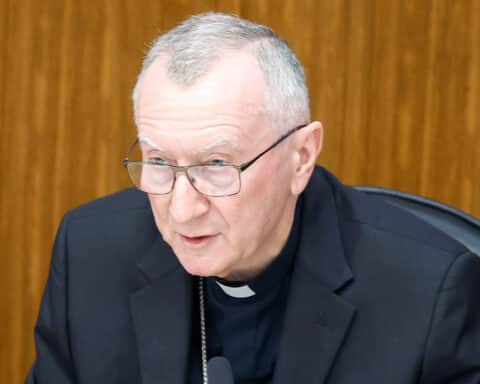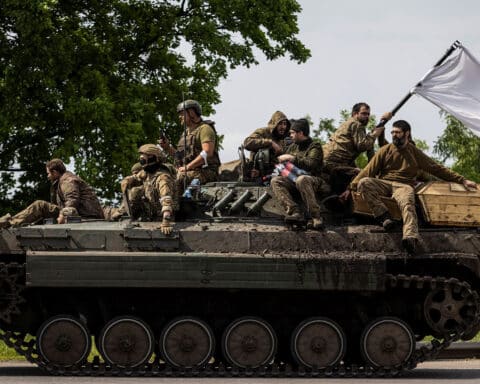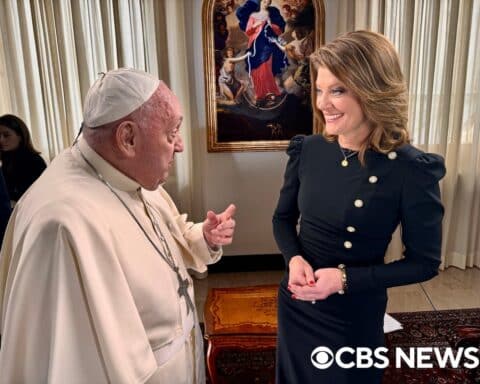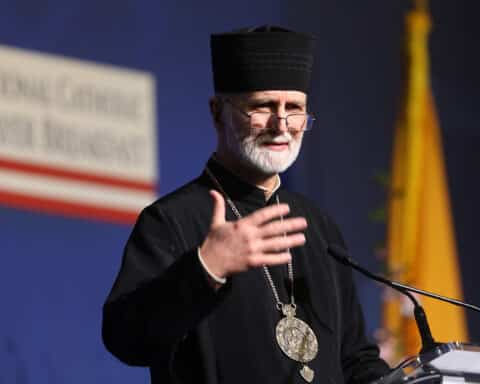(OSV News) — While the head of Russia’s Orthodox Church backed President Vladimir Putin’s attempts to put down a military rebellion, a Catholic bishop in Ukraine warned current events presented “both hope and danger” for his own country.
“Today, when our brothers are fighting and dying on the fronts, selflessly fulfilling their duty, and when the enemies are making every effort to destroy Russia, any attempt to sow discord in our country is the greatest crime, with no justification,” Patriarch Kirill said in a national message June 24.
The Orthodox leader spoke as troops from the Wagner Group, a mercenary force, were advancing toward Moscow, after seizing the strategic southern city of Rostov-on-Don. By late evening June 24, The Associated Press reported that the Wagner Group’s boss, Yevgeny Prigozhin, claimed he had halted his fighters and they were turning back.
Wagner mercenary present severe threat
Meanwhile, a Catholic bishop in Ukraine told OSV News that the Wagner Group’s forces could represent an even worse threat to his country, and he urged Catholics worldwide to pray God would “lead events in a good direction.”
“We are in shock — no one foresaw such a turn of events, just as no one expected war a year ago,” said Auxiliary Bishop Jan Sobilo of Kharkiv-Zaporizhzhya said in a June 24 interview.
“The fact that some of Russia’s armed forces are now taking action against their own Defense Ministry offers hope for Ukraine — that we could win this war sooner than we thought,” the bishop said. “But while any country becomes momentarily weaker when confronted with internal problems, there are also grave dangers of destabilization — and where there’s destabilization, unforeseen processes could be set in motion.”
Patriarch Kirill continues to back Putin
In his statement, Patriarch Kirill said, “As primate of the Russian church, I urge those who have taken up arms and are ready to direct them against their brethren to think again. Faced with a common threat, we must maintain unity of mind and overcome grievances and personal ambitions — no matter how difficult this may sometimes be.”
He said Russians were called upon to “preserve national unity, pray to God, and support the soldiers” with all their strength at a time of “military confrontation,” adding that he supported Putin’s efforts “to prevent unrest” and would call on all Orthodox clergy to deliver “solemn prayers” for “preserving peace and unity, now jeopardized by calls for confusion.”
In a June 24 social media post, Prigozhin, the Wagner Group’s leader, said his troops, who make up a quarter of Russian combat forces in Ukraine, had seized “all military facilities” in Rostov-on-Don, and were deploying further north to Voronezh in a move to overthrow Defense Minister Sergei Shoigu and Russia’s military leadership.
Reuters news agency said Russian artillery and helicopter gunships had opened fire on Wagner units on their drive toward Moscow, as Western governments said they were carefully monitoring the dramatic escalation.
In a televised June 24 national address, Putin branded the rebellion a “stab in the back” for Russia’s people, comparable to the 1917 wartime Bolshevik uprising, and urged those “deceptively pulled into the criminal adventure” to back down.
He added that Russians were fighting for their “sovereignty and independence,” and the right “to remain Russia, a state with a thousand-year history,” against “aggression by neo-Nazis and their handlers” at a time when “the whole military, economical and information machines of the West” are “directed against us.”
“Anyone who consciously went on the path of betrayal, who prepared the armed mutiny, went on the path of blackmail and terrorist actions, will be punished inevitably,” Putin warned, adding that “actions to defend the fatherland from such a threat will be brutal.”
“What we’re facing is exactly a betrayal. Big ambitions and personal interests led to treason. Betrayal of one’s own country and people and of the cause that fighters of Wagner were dying for alongside our soldiers,” Putin said.
However, the charge of betrayal was angrily rejected in a separate social media message by Prigozhin, who said his troops were “the homeland’s patriots” and would not surrender.
“We do not want our country to continue living with corruption, deception and bureaucracy,” the mercenary boss added.
“When told we were at war with Ukraine, we went and fought. But it turned out that ammunition, weapons and all the money invested in them were being stolen,” Prigozhin stated.
A military coup prompts rebellion
The dramatic developments, which were described as a “military coup” by Ukraine’s Religious Information Service (RISU), occurred as the head the Ukrainian Catholic Church, Archbishop Sviatoslav Shevchuk, reiterated his country’s readiness to “start a dialogue, sit at the table and plan a future together” in a June 23 TV interview, but warned Russia must first “change its perception of the Ukrainian people” and accept its right to exist.
Meanwhile, Bishop Sobilo told OSV News serious events were clearly underway in Russia, adding that Ukrainians would pray the ultimate outcome would be positive for their war-torn country.
“Let’s hope God will direct affairs in such a way that this latest trouble ends well for both Russia and Ukraine — in our victory, but also, most importantly, without this conflict leading to a global nuclear war,” the Kharkhiv-Zaporizhzhia auxiliary told OSV News.
“All we know for certain is that this chaos will bring great political change in Russia and this part of Europe. So we must all watch events very carefully, praying that our generation will be the one to witness not only the conversion of Russia but the beginning of a real peace throughout the world,” he added.
Russian state TV rebroadcast June 24 a homily that Patriarch Kirill preached at Tobolsk June 11, denouncing “Western civilization” and urging “prayers for the fatherland and supreme commander-in-chief President Putin,” as well as warning against “the inadmissibility of betrayal” in attempts to defend the country.
In a June 24 message, the head of Russia’s Union of Evangelical Christians, Bishop Sergei Ryakhovsky, said he also believed it was “important to remain in unity and solidarity to save the country for a great awakening” during a “difficult military-political situation.”
Former U.S. Ambassador to Russia Michael McFaul wrote in a tweet June 24, “No matter how it ends, Prigozhin’s actions in the last 24 hours have weakened Putin. Anything that weakens Putin is good for Ukraine.”





